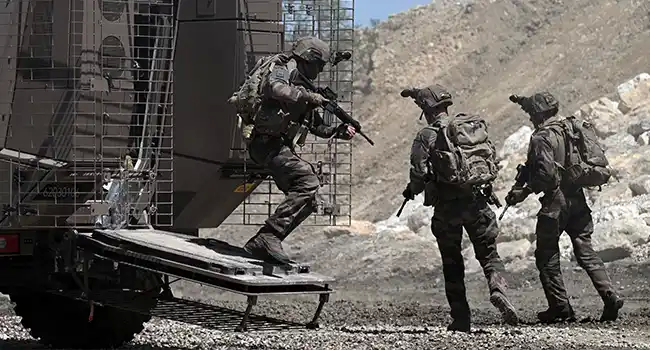French soldiers who have been fighting Islamist militants in Burkina Faso have been ordered to leave the country in a month time, dealing another blow to Europe’s presence in a region where Russia’s influence is growing.
The failure to stop the jihadist violence and Russia’s growing foothold in the region propelled thus decision.
Burkina Faso is one of the world’s poorest, and has been battling a deadly jihadist insurgency since 2015 which has resulted in many killed, especially in the north and east of the country. The West African country has been rocked by two coups since the start of the year, with each new leader accusing the previous of having failed to quell the violence. So far, Jihadists control around 40 percent of Burkino Faso’s territory.
The decision by the government in Ouagadougou to abandon its military alliance with its former colonial power comes five months after France completed its withdrawal from neighboring Mali, which in 2021 hired the Russian paramilitary Wagner Group to support its war against jihadists affiliated with al Qaeda and Islamic State.
Speaking on Burkina Faso’s state broadcaster RTB, Communication Minister Rimtalba Ouedraogo said the country’s armed forces would lead the fight against extremists themselves and made no mention of Russian support.
“It’s the Burkinabe themselves who will make the sacrifice to liberate our territory,” Mr. Ouedraogo said. France currently has around 400 troops stationed in Burkina Faso.
The foreign ministry letter, dated last Wednesday, ends the 2018 agreement under which French troops were stationed there, and sets a deadline of a month for their departure.
Earlier Sunday, French President Emmanuel Macron was asked about Ouagadougou’s request that French troops leave the country, as reported late Saturday by Burkina Faso’s state news agency AIB.
Macron urged “a lot of prudence”, saying there was “great confusion” over the remarks reported in the media and said military junta leader Ibrahim Traore needed to take a public stance.
“We are waiting for clarifications on the part of Mr. Traore,” he told reporters.
France has 400 special forces soldiers stationed in junta-ruled Burkina to battle an Islamist insurgency, but relations have deteriorated in recent months.
There are signs that Burkina Faso, like its neighbour Mali, is turning towards Russia as a partner.
Few weeks ago, the French military completed it’s withdrawal from the Central African Republic, as the last soldier left the capital Bangui. The departure of French troops from the French colony comes almost four months after the exit of French troops from Mali,
Burkinababe Captain Ibrahim Traoré, who came to power in a September coup, has been pursuing closer ties with Russia.
“Russia is a reasonable choice in this dynamic,” Burkinabe Prime Minister Apollinaire Kyelem de Tembela said last week following a meeting with the Russian ambassador.
“We think our partnership has to be strengthened,” he added.
In December, Burkina Faso’s prime minister, Apollinaire Kyélem de Tambèla, traveled to Moscow on what he said was a private visit to discuss how the two countries could cooperate.
“We want Russia to be an ally in the fight against terrorism, like all our partners,” Mr. Kyélem de Tambèla said in an interview with Russian broadcaster RT. “We know that Russia is a great power and if Russia wants, it can really help us in this area.”
A spokeswoman for the French foreign ministry said Monday that Paris was still waiting for clarifications from Mr. Traoré.
“France is readjusting, in consultation with its partners, its presence in the Sahel region to continue to stand by the countries engaged in the fight against terrorism,” she said.
Burkina Faso citizens have protested for months against the French military presence, accusing Paris of failing to tackle the terrorist threat, with some claiming that French troops were providing arms to the jihadists.
To augment it’s counter insurgency forces, the government of Burkina Faso recruited 50,000 civilian defense volunteers to help the army fight jihadists, announcing that its top priority would be to secure the nation’s territory, after the latest coup to rock the jihadist-torn Sahel state.





